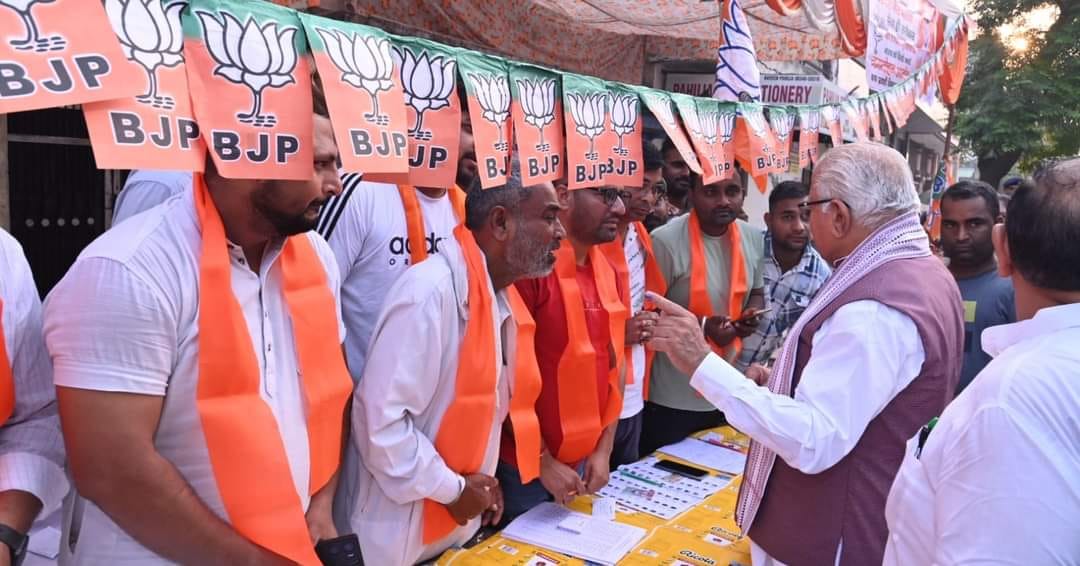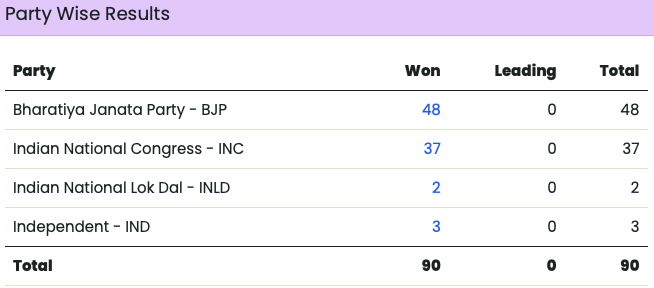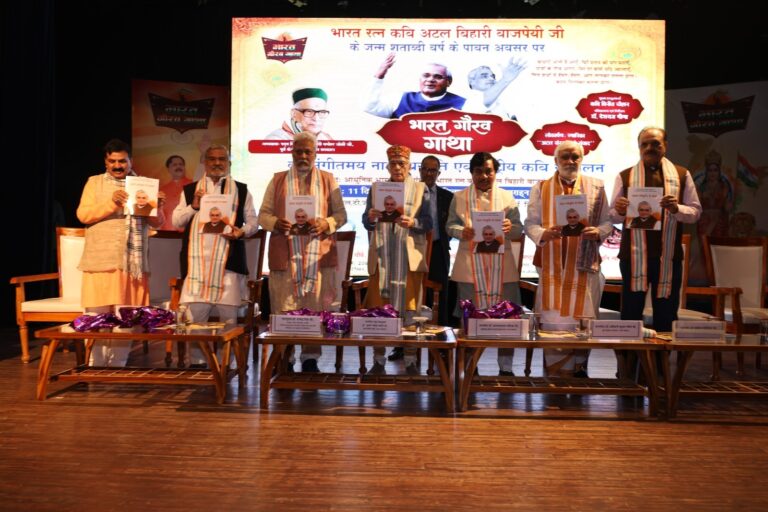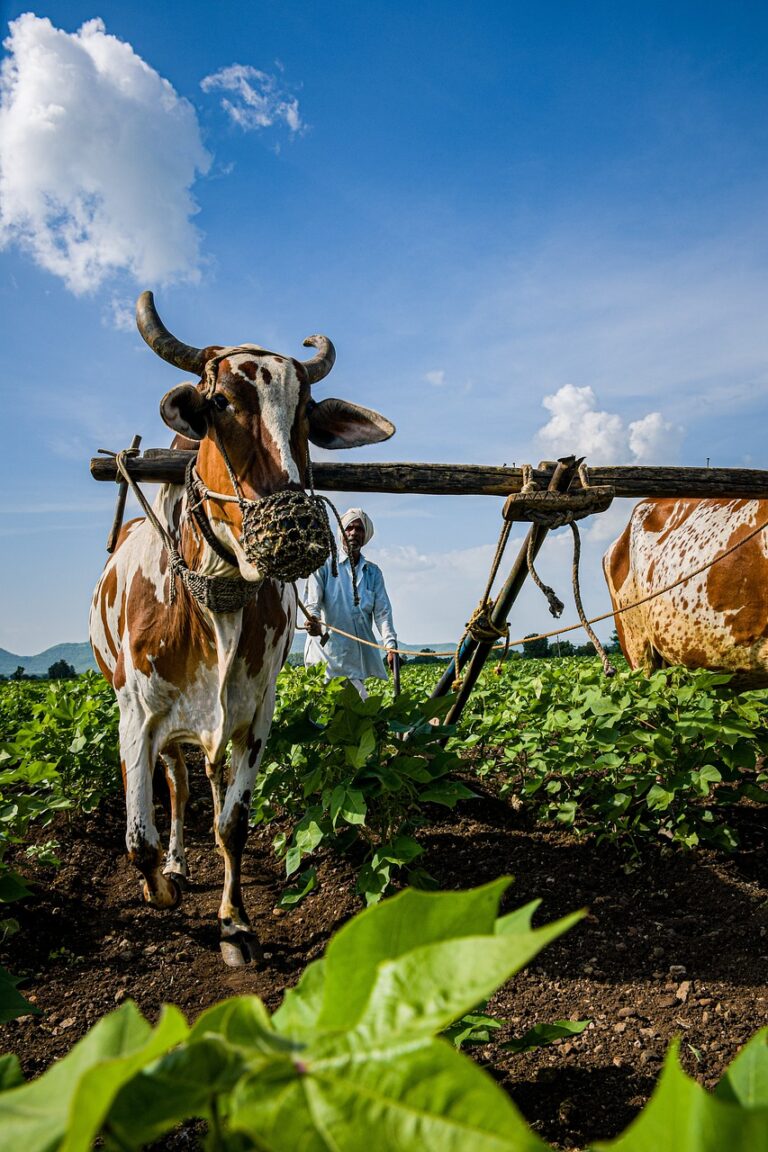
The Bharatiya Janata Party (BJP) defied exit polls and did a hattrick in Haryana where the State Assembly election results today surprised the pollsters. In Haryana the BJP came back to power for a historic third term, defying the predictions of exit polls that predicted a Congress Party victory. Finally, in the 90-member Assembly, the BJP got an impressive 48 seats and stopped Congress at 37 seats. As counting progressed, the BJP gradually consolidated its lead and wiped off Congress’ initial gains.
At 9.30 am, early trends showed huge leads for the Congress Party in several places and everyone felt the results were on expected lines. At the All India Congress Committee (AICC) headquarters in New Delhi, one could see the crackers being burst and laddoos distributed by the party cadres.
However, the joy was shortlived as by 11.30 am the counting took a reverse trend with the BJP taking the lead over the Congress and crossing the halfway mark of 45 seats. Suddenly, there were protests from the Congress camp questioning the slowing of trends on the Election Commission site. AICC spokesman Jairam Ramesh claimed the Electronic Voting Machines (EVMs) were manipulated and he accused the BJP of subverting the people’s will.
The Election Commission dismissed the Congress charges as unsubstantiated. The Commission said it “unequivocally rejects” the party’s attempt to “surreptitiously give credence to irresponsible, unfounded and uncorroborated malafide narratives”.
Banking heavily on Jat stalwart and former chief minister Bhupender Singh Hooda and sidelining Dalit leader Kumari Selja may have cost the Congress Party dearly. Present Lok Sabha member and former cabinet minister Kumari Selja could manage to get just 9 tickets for her loyalists against Hooda’s loyalists getting 70. A fuming Selja, a five-term MP, who wielded influence among Dalit voters, stayed away from campaigning for the most part and skipped the party’s manifesto launch event.
The consolidation of non-Jat votes by the BJP hurt the Congress Party further. It focused its efforts on wooing the Jats, who constitute about 25 per cent of the state population, and neglecting the politically consequential Ahirwal belt which comprises urban and industrial centres of Gurugram, Faridabad, Rewari and Mahendragarh.
Sources at the AICC said that after Om Prakash Chautala and Devi Lal, it was Hooda who dominated the Jat politics of Haryana. But today’s poll results came as a big jolt for Hooda. During the campaign, he painted the Congress party into a Jat party in Haryana and that helped consolidate non-Jat votes for the BJP. With the BJP performing well in Jat-dominated seats, the so-called Jat formula became irrelevant, critics pointed out.
Naib Singh Saini is credited as the key architect behind the BJP’s success in Haryana. Brought as a stop-gap arrangement seven months before the elections, replacing Manohar Lal Khattar as Chief Minister, Saini became the face of the BJP’s campaign. His leadership is seen as instrumental in overcoming anti-incumbency and securing the party’s third consecutive term in the state. The BJP’s decade-long non-Jat formula empowered other communities through leaders of OBC chief ministers like Manohar Lal Khattar and the present Naib Singh Saini.
In other words, the Congress Party’s overemphasis on Jats ended up being counterproductive. It resulted in the counter-consolidation of non-Jat voters. The Congress’ numbers show that its performance has taken a hit from counter-Jat polarisation. Even in the Jats-dominated seats, the Congress tally is the same as that of the BJP. Out of 36 Jat-dominated seats, Congress won 18 seats, just two seats more than the BJP.
To counter the influence of the Hooda family, the BJP repeatedly targeted over-emphasis on Rohtak, which is Hooda’s Lok Sabha seat and pocket borrow. As a result, there was uneven development of the state during Bhupender Singh Hooda’s tenure as chief minister. Union Minister Khattar openly provoked Congress leader Selja to quit Congress and join the BJP.
Moreover, the Congress Party saying it would breach the 50 per cent cap on reservations mandated by the Supreme Court, shocked the upper caste Jats, its own vote bank. The idea of doing away with the upper limit on reservation and reservation based on population might have shocked Jat voters.
The Jats have long been arguing for their inclusion into the OBCs which enjoy 27 per cent reservation in education and government jobs. Without their inclusion in the OBCs category, if the cap is removed, then the Jats would be at the receiving end.
There were no major defeats or upsets among the Congress candidates. Congress candidate and wrestler Vinesh Phogat won in Julana on her poll debut. The Olympian secured 64,548 votes and beat her nearest rival, BJP’s Yogesh Kumar by 6553 votes.
*Senior journalist







